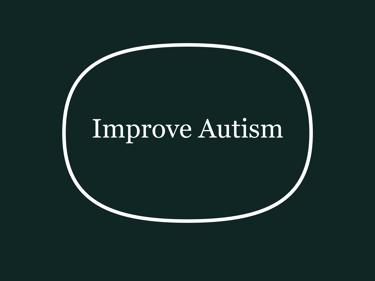Carnivore diet and Autism
Research
Ketogenic diet versus gluten free casein free diet in autistic children: a case-control study
Authors:
El-Rashidy, O., El-Baz, F., El-Gendy, Y., Khalaf, R., Reda, D. and Saad, K
Research study
Year
Type
Study size
Abstract
LINK/DOI
Many diet regimens were studied for patients with autism spectrum disorder (ASD) over the past few years. Ketogenic diet is gaining attention due to its proven effect on neurological conditions like epilepsy in children. Forty-five children aged 3-8 years diagnosed with ASD based on DSM-5 criteria were enrolled in this study. Patients were equally divided into 3 groups, first group received ketogenic diet as modified Atkins diet (MAD), second group received gluten free casein free (GFCF) diet and the third group received balanced nutrition and served as a control group. All patients were assessed in terms of neurological examination, anthropometric measures, as well as Childhood Autism Rating Scale (CARS), Autism Treatment Evaluation Test (ATEC) scales before and 6 months after starting diet. Both diet groups showed significant improvement in ATEC and CARS scores in comparison to control group, yet ketogenic scored better results in cognition and sociability compared to GFCF diet group. Depending on the parameters measured in our study, modified Atkins diet and gluten free casein free diet regimens may safely improve autistic manifestations and could be recommended for children with ASD. At this stage, this study is a single center study with a small number of patients and a great deal of additional wide-scale prospective studies are however needed to confirm these results.
45
Case controlled study
2017
doi: 10.1007/s11011-017-0088-z


Comprehensive Nutritional and Dietary Intervention for Autism Spectrum Disorder-A Randomized, Controlled 12-Month Trial
Authors:
Adams, J.B., Audhya, T., Geis, E., Gehn, E., Fimbres, V., Pollard, E.L., Mitchell, J., Ingram, J., Hellmers, R., Laake, D. and Matthews, J.S.
Research study
Year
Type
Study size
Abstract
LINK/DOI
This study involved a randomized, controlled, single-blind 12-month treatment study of a comprehensive nutritional and dietary intervention. Participants were 67 children and adults with autism spectrum disorder (ASD) ages 3-58 years from Arizona and 50 non-sibling neurotypical controls of similar age and gender. Treatment began with a special vitamin/mineral supplement, and additional treatments were added sequentially, including essential fatty acids, Epsom salt baths, carnitine, digestive enzymes, and a healthy gluten-free, casein-free, soy-free (HGCSF) diet. There was a significant improvement in nonverbal intellectual ability in the treatment group compared to the non-treatment group (+6.7 ± 11 IQ points vs. -0.6 ± 11 IQ points, p = 0.009) based on a blinded clinical assessment. Based on semi-blinded assessment, the treatment group, compared to the non-treatment group, had significantly greater improvement in autism symptoms and developmental age. The treatment group had significantly greater increases in EPA, DHA, carnitine, and vitamins A, B2, B5, B6, B12, folic acid, and Coenzyme Q10. The positive results of this study suggest that a comprehensive nutritional and dietary intervention is effective at improving nutritional status, non-verbal IQ, autism symptoms, and other symptoms in most individuals with ASD. Parents reported that the vitamin/mineral supplements, essential fatty acids, and HGCSF diet were the most beneficial.
67
Randomised controlled trial
2018
doi: 10.3390/nu10030369
A Ketogenic Diet and the Treatment of Autism Spectrum Disorder
Authors:
Li, Q., Liang, J., Fu, N., Han, Y. and Qin, J.
Research study
Year
Type
Study size
Abstract
LINK/DOI
Autism spectrum disorder (ASD) is characterized by stereotyped behavior and deficits in communication and social interaction. There are no curative treatments for children with ASD. The ketogenic diet (KD) is a high-fat, appropriate-protein, and low-carbohydrate diet that mimics the fasting state of the body and is proven beneficial in drug-resistant epilepsy and some other brain diseases. An increasing number of studies demonstrated that a KD improved autistic behavior, but the underlying mechanisms are not known. We reviewed the neuroprotective role of a KD in ASD, which is likely mediated via improvements in energy metabolism, reductions in antioxidative stress levels, control of neurotransmitters, inhibition of the mammalian target of rapamycin (mTOR) signaling pathway, and modulation of the gut microbiota. A KD is likely a safe and effective treatment for ASD.
Not specified
Narrartive review
2021
doi: 10.3389/fped.2021.650624
A modified ketogenic gluten-free diet with MCT improves behavior in children with autism spectrum disorder
Authors:
Lee, R.W., Corley, M.J., Pang, A., Arakaki, G., Abbott, L., Nishimoto, M., Miyamoto, R., Lee, E., Yamamoto, S., Maunakea, A.K. and Lum-Jones, A.
Research study
Year
Type
Study size
Abstract
LINK/DOI
Purpose
The ketogenic diet is a low-carbohydrate, moderate protein, high-fat diet that has emerged as a potential treatment for autism spectrum disorder. Autism spectrum disorder is a neurodevelopmental disorder of social communication, and restricted, repetitive behaviors and interests in need of novel therapies. An open-label clinical trial was done in Honolulu, Hawaii to test a modified ketogenic diet for improvement of core clinical impairments in children with ASD.
Intervention
A modified ketogenic gluten-free diet regimen with supplemental MCT was completed in 15 children ages 2 to 17 years for 3 months. Clinical (ADOS-2, CARS-2) and biochemical measures were performed at baseline and 3-months on the ketogenic diet.
Main outcome
Children administered a modified ketogenic gluten-free diet with supplemental MCT significantly improved core autism features assessed from the ADOS-2 after 3 months on diet (P = 0.006). No significant difference was observed in restricted and repetitive behavior score (P = 0.125) after 3 months on the diet protocol. Substantial improvement (> 30% decrease ADOS-2 total score) was observed in six participants, moderate improvement (> 3 units) in two participants, and minor/no improvement in seven participants. Ten participants assessed at a six-month time point sustained improvement in total ADOS-2 and social affect subdomain scores comparing baseline and 6 months (P = 0.019; P = 0.023), but no significant improvement in restricted and repetitive behavior scores were noted (P = 0.197). Significant improvements in CARS-2 items after 3 months of the modified ketogenic protocol were observed in imitation, body use, and fear or nervousness (P = 0.031, P = 0.008, P = 0.039). The percent change on ADOS-2 score from baseline to 3 months was associated with baseline high-density lipoprotein levels (ρ = −0.67, P = 0.007) and albumin levels (ρ = −0.60, P = 0.019). Moreover, the percent change from baseline to 3 months in ADOS-2 scores was significantly associated with percent change in high-density lipoprotein levels (ρ = 0.54, P = 0.049) and albumin levels (ρ = 0.67, P = 0.010).
Conclusions
A modified gluten-free ketogenic diet with supplemental MCT is a potentially beneficial treatment option to improve the core features of autism spectrum disorder and warrants further investigation.
15
Open label observer blinded clinical trial
2018
doi: 10.1016/j.physbeh.2018.02.006
Ketogenic Diet Induced Shifts in the Gut Microbiome Associate with Changes to Inflammatory Cytokines and Brain-Related miRNAs in Children with Autism Spectrum Disorder
Authors:
Allan, N.P., Yamamoto, B.Y., Kunihiro, B.P., Nunokawa, C.K., Rubas, N.C., Wells, R.K., Umeda, L., Phankitnirundorn, K., Torres, A., Peres, R. and Takahashi, E.
Research study
Year
Type
Study size
Abstract
LINK/DOI
In this interventional pilot study, we investigated the effects of a modified ketogenic diet (KD) on children with autism spectrum disorder (ASD). We previously observed improved behavioral symptoms in this cohort following the KD; this trial was registered with Clinicaltrials.gov (NCT02477904). This report details the alterations observed in the microbiota, inflammation markers, and microRNAs of seven children following a KD for a duration of 4 months. Our analysis included blood and stool samples, collected before and after the KD. After 4 months follow up, we found that the KD led to decreased plasma levels of proinflammatory cytokines (IL-12p70 and IL-1b) and brain-derived neurotrophic factor (BDNF). Additionally, we observed changes in the gut microbiome, increased expression of butyrate kinase in the gut, and altered levels of BDNF-associated miRNAs in the plasma. These cohort findings suggest that the KD may positively influence ASD sociability, as previously observed, by reducing inflammation, reversing gut microbial dysbiosis, and impacting the BDNF pathway related to brain activity.
7/11
Interventional pilot study
2024
doi: 10.3390/nu16101401
Application of a ketogenic diet in children with autistic behavior: pilot study
Authors:
Evangeliou, A., Vlachonikolis, I., Mihailidou, H., Spilioti, M., Skarpalezou, A., Makaronas, N., Prokopiou, A., Christodoulou, P., Liapi-Adamidou, G., Helidonis, E. and Sbyrakis, S.
Research study
Year
Type
Study size
Abstract
LINK/DOI
A pilot prospective follow-up study of the role of the ketogenic diet was carried out on 30 children, aged between 4 and 10 years, with autistic behavior. The diet was applied for 6 months, with continuous administration for 4 weeks, interrupted by 2-week diet-free intervals. Seven patients could not tolerate the diet, whereas five other patients adhered to the diet for 1 to 2 months and then discontinued it. Of the remaining group who adhered to the diet, 18 of 30 children (60%), improvement was recorded in several parameters and in accordance with the Childhood Autism Rating Scale. Significant improvement (> 12 units of the Childhood Autism Rating Scale) was recorded in two patients (pre-Scale: 35.00 +/- 1.41[mean +/- SD]), average improvement (> 8-12 units) in eight patients (pre-Scale: 41.88 +/- 3.14[mean +/- SD]), and minor improvement (2-8 units) in eight patients (pre-Scale: 45.25 +/- 2.76 [mean +/- SD]). Although these data are very preliminary, there is some evidence that the ketogenic diet may be used in autistic behavior as an additional or alternative therapy.
30
Pilot perspective follow-up study
2003
doi: 10.1177/08830738030180020501
Autism and Dietary Therapy: Case Report and Review of the Literature
Authors:
Herbert, M.R. and Buckley, J.A.
Research study
Year
Type
Study size
Abstract
LINK/DOI
We report the history of a child with autism and epilepsy who, after limited response to other interventions following her regression into autism, was placed on a gluten-free, casein-free diet, after which she showed marked improvement in autistic and medical symptoms. Subsequently, following pubertal onset of seizures and after failing to achieve full seizure control pharmacologically she was advanced to a ketogenic diet that was customized to continue the gluten-free, casein-free regimen. On this diet, while still continuing on anticonvulsants, she showed significant improvement in seizure activity. This gluten-free casein-free ketogenic diet used medium-chain triglycerides rather than butter and cream as its primary source of fat. Medium-chain triglycerides are known to be highly ketogenic, and this allowed the use of a lower ratio (1.5:1) leaving more calories available for consumption of vegetables with their associated health benefits. Secondary benefits included resolution of morbid obesity and improvement of cognitive and behavioral features. Over the course of several years following her initial diagnosis, the child’s Childhood Autism Rating Scale score decreased from 49 to 17, representing a change from severe autism to nonautistic, and her intelligence quotient increased 70 points. The initial electroencephalogram after seizure onset showed lengthy 3 Hz spike-wave activity; 14 months after the initiation of the diet the child was essentially seizure free and the electroencephalogram showed only occasional 1-1.5 second spike-wave activity without clinical accompaniments.
1
Case report and review of literature
2013
doi: 10.1177/0883073813488668


